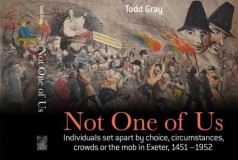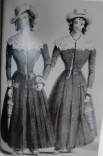
A talk from Todd Gray elicits so much interest that we cannot fit everyone in. So we asked him to give his talk twice, on 8 October and again on the 17th. As ever, on both occasions he delighted and also horrified us as he took us through a history of our intolerance towards those who were reviled over past centuries, singled out and considered problematic, inconvenient, belligerent or just plain awkward.
We learnt about the appalling behaviour of crowds and mobs and that they were often instigated by vested interests which included local and national governments and churches. Below are a few of the many examples he gave:
· In the 1880s the City Council organised 1,000 men to attack Methodists in their chapel over five nights - notwithstanding that the Methodists had clearly stated their allegiance to the Church of England. The Methodists were then arrested “for making trouble.”
· When subsequently the Salvation Army appeared and promoted temperance very successfully, local publicans worried about their profits so paid a violent mob known as “the skeleton army” to disrupt the Army’s marches. The Council also paid 5,000 working class people to attack the Army in the street and their hall. Through nine years of violence the police stood back.
· Around this time the mayor was accused of employing men to attack the bishop who was considered to be far too right wing. The mayor, however, categorically denied any such behaviour, notwithstanding undeniable evidence to the contrary.
· Gunpowder Day in Exeter was always rowdy. Young men were paid in food and drink to attack Roman Catholics and anyone considered too high church (wearing a surplice was enough). Effigies of reviled people - for instance a curate, his servant and their baby - were carried through the streets and then burnt on Cathedral Green. The unpopular Bishop Philpot had his effigy burnt every year. It wasn’t until the 1890s that these “celebrations” were relocated away from the Cathedral area.
Voting rights for all were a contentious issue, much disliked by those who already had the vote. They took great (and probably illegal) steps to thwart those who called for universal voting rights.
· In 1819 a black dwarf was imprisoned for two years for distributing a leaflet promoting voting rights.
· In 1909 three suffragettes were arrested for demanding the right to vote. They were taken to the police station and then to prison. In this case the crowds were not against them but the authorities were. Delightfully, the three prisoners sang all night to keep the wardens awake!
· Three years later, Mrs Pankhurst was arrested in Plymouth on her way back from America and brought to prison in Exeter.
· The authorities were so afraid of the French Revolution spreading to England that in the 19th century a man was imprisoned for saying all men were equal. But they were forced to release him as legally his statements were not treason or sedition.
The treatment of women was unkind and often shocking. Todd quoted a few examples:
· Twin sisters were ridiculed and despised for their identical strange clothing and perhaps because one grandparent had been a slave. Their skirts were short enough to display their pantaloons and throughout their lives they silently walked the street of Torquay and Exeter arm in arm. Called the Alphington Ponies, they had pretentions to grandeur but were ignored (or sneered at) throughout their lives.
· A teenage vagrant (probably a prostitute) was arrested in 1834 and condemned to seven years transportation for stealing a handkerchief. But she was released to her father and then disappeared only to turn up some time later in a London prison. There she broke glass windows to ensure she stayed there. Eventually she was released but soon found dead. Women in prison said they broke windows to extend their sentences because they felt safer there.
· An estimated 20,000 people watched from Northernhay Gardens the hanging of a wife convicted of poisoning her husband. As she fell she grasped a plank but the jailers knocked it free. Her neck was not broken and she was struggling for air so the jailer dragged on her legs to stretch her body. As she died the crowds sang and cheered.
Physical difference was a (sad) means of earning a living so freak shows were considered a great entertainment. These only ceased as recently as the 1970s
· At the Victoria Hall in Queen Street female conjoined twins were featured. Born into slavery these two girls had been on show all their lives, even as babies.
· By the 1860s and 1870s ex-slaves were performing in slave outfits but many were blacked up white skinned people due to a shortage of available black people.
· In the 1930s two well known black artists performing in Exeter were evicted by their landlady simply because of their colour.
Meanwhile, those in power suffered no punishment:
· Exeter’s Chief Constable was known for his “heavy fists” and for organising attacks on the Salvation Army. In London in 1875 he lost his wallet - claiming to have been pickpocketed by a passing prostitute. Although his claims were obviously completely false, he was not prosecuted.
· The Earl of Devon in 1870 had run up gambling debts amounting to, in today’s money, about £51 million. He had incurred many of those debts by signing documents with false names but he was not prosecuted and he escaped his debts by fleeing to Istanbul.
Todd ended his talk by stressing how important it was not to see people by categories but instead to see them individually for what they are. It is important that we never descend into the intolerance of the past.
If your appetite is whetted by this talk, Todd’s book “Not One Of Us” gives immensely more detail about the strange and often horrible behaviour of our ancestors. It is available in Waterstones.



